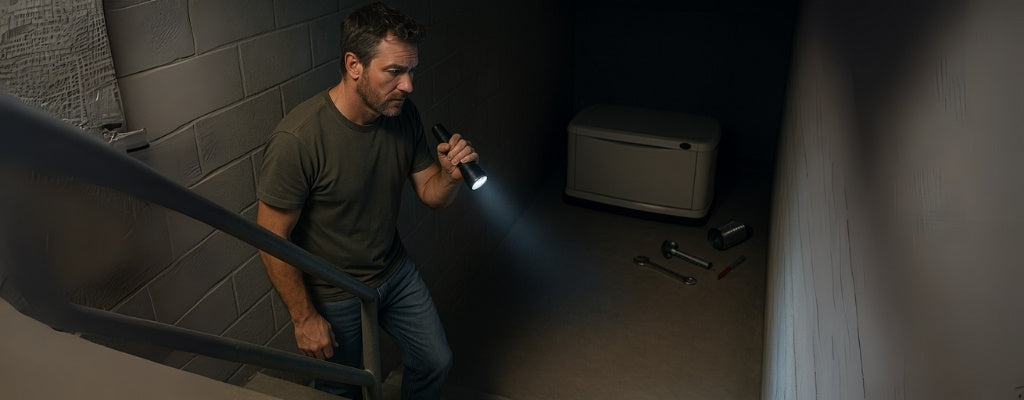
Can Generators Be Installed in Basements?
Ever thought of chucking a generator in the basement to keep it dry and out of sight? Short answer: you can—but only if it's well-ventilated and professionally set up. A basement install can be clever or downright dangerous, so let's talk about how to do it the right way.

Understanding Basement Generator Installations
When the power’s out and the storm’s raging, a generator downstairs can keep things humming. It’s out of sight, muffles the noise, and stays protected from the weather—but it’s not without its challenges. Here’s what you need to know before you fire one up below ground level.
Benefits of Installing Generators in Basements
Basement setups come with a few solid upsides:
-
Less noise – The concrete walls soak up the sound.
-
Cleaner look – No bulky eyesore sitting in your yard.
-
Protected from weather – Rain and sun won’t get to it.
-
Lower theft risk – Out of sight, less likely to go missing.
They’re especially useful during long blackouts, which is a lifesaver for households with babies, elderly family, or medical equipment.

Common Concerns About Basement Installations
It’s not all sunshine and backup power. Basements can pose serious problems:
-
Ventilation is critical – Generators pump out carbon monoxide, and that stuff’s lethal.
-
Damp conditions – Basements are prone to moisture, which can wreck your gear.
-
Tricky access – Refuelling or doing maintenance isn’t always easy.
If done wrong, a basement install can turn into a hazard rather than a help.
Key Considerations Before Installing a Generator
Thinking about popping one in? Take a breath. There’s more to it than just finding a spare corner.
Local Regulations and Safety Standards
Start by checking your local council or state guidelines. Every area has its own set of rules around:
-
Indoor use of generators
-
Required ventilation systems
-
Electrical and fire safety codes
You might also need approval or permits before getting started. Ignore this and you’re asking for trouble.
Importance of Permits and Inspections
Permits aren’t just red tape—they’re protection. An inspection checks things like airflow, wiring, and overall safety.
When passed, it’s proof you’re in the clear and not risking a house full of fumes or dodgy electrics.

Ventilation Requirements for Basement Generators
This is the big one. Carbon monoxide is invisible, odourless, and deadly. Without proper airflow, it builds up fast.
At minimum, you’ll need:
-
A sealed exhaust vent directed outside
-
A carbon monoxide alarm in the room
-
Steady airflow for cooling and ventilation
Seriously—don’t DIY this. Get a qualified professional who knows the rules and how to install safely.
Recommended Safety Practices
If you’re going ahead with a basement install, be smart about it:
-
Keep flammables far away
-
Schedule regular maintenance
-
Use certified installers only
-
Install a CO detector and test it regularly
Simple steps can prevent a dangerous situation.

Choosing the Right Generator for Your Basement
Not all generators suit basement life. The wrong one could cause more trouble than it’s worth.
Generator Types and Sizing
Standby generators are the safest bet indoors. They switch on automatically, are fixed in place, and don’t need you to babysit them.
Pick a model that suits your home’s needs. Go too small and it’ll struggle. Too big and you’ll chew through fuel for no reason.
A licensed electrician can help you figure out the ideal capacity based on what you want powered.
Professional Installation
This one’s a must. Between wiring, fumes, and moisture, you need someone who knows their stuff.
A qualified installer will:
-
Recommend the right model
-
Design a safe venting system
-
Handle all electrical work
-
Ensure everything ticks the safety boxes
Yes, it’ll cost more up front. But it’ll save you from repairs, safety risks, or insurance headaches later.
You might also like:
- How Do You Keep a Portable Generator Dry?
- Can I Use a Generator to Power My House in Australia?
-
How to Use a Generator During a Power Outage in Australia?
-
What Should a Generator Sit On?
-
What Should You Not Plug Into a Generator?
-
Where Can I Put My Generator?
- Where Is the Best Place to Put a Generator?


